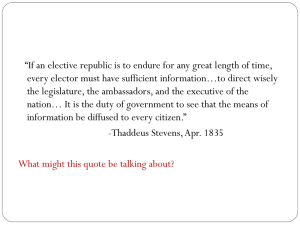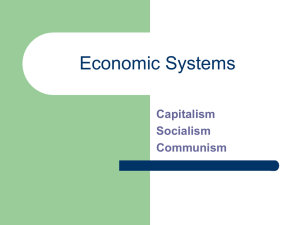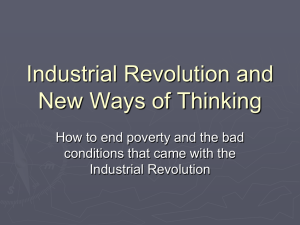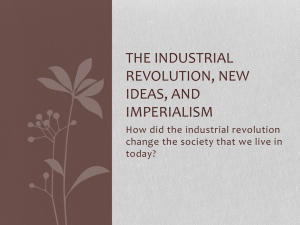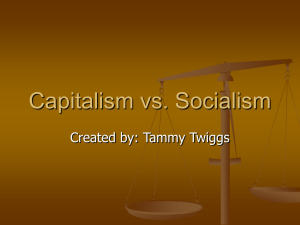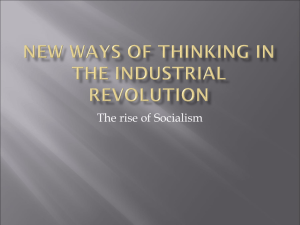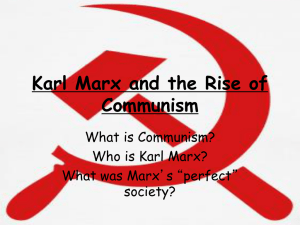Alternative-Economic-Systems
advertisement
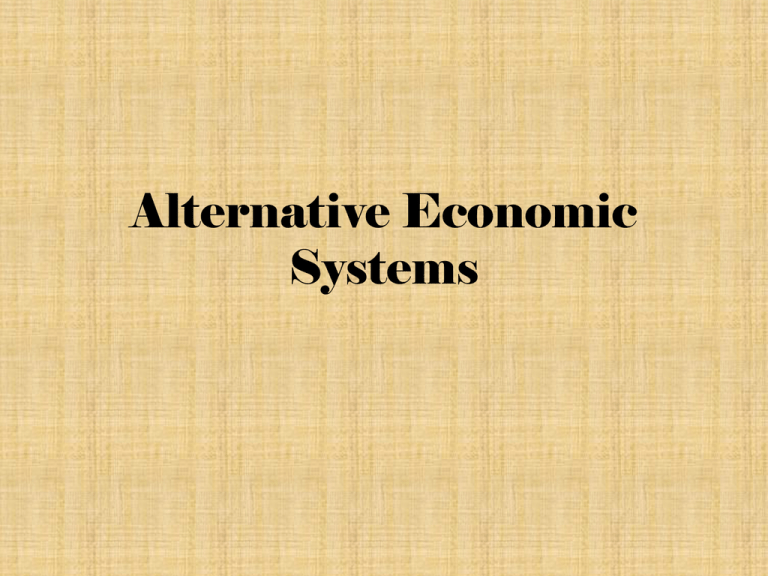
Alternative Economic Systems Communism: Theory • Karl Marx believed history was a struggle between capitalists (owned means of production) and others (who worked for capitalists). Communism: Theory • Karl Marx believed history was a struggle between capitalists (owned means of production) and others (who worked for capitalists). • During the Industrial Revolution, the means of production became too expensive for most people to own Communism: Theory • During the Industrial Revolution, the means of production became too expensive for most people to own • This allowed capitalists to make large profits Communism: Theory • During the Industrial Revolution, the means of production became too expensive for most people to own • This allowed capitalists to make large profits • Exploited the workers, workers couldn’t afford products which led to overproduction and eventually recessions Communism: Theory • Exploited the workers, workers couldn’t afford products which led to overproduction and eventually recessions • At some point, workers would tire of conditions and revolt Communism: Theory • Exploited the workers, workers couldn’t afford products which led to overproduction and eventually recessions • At some point, workers would tire of conditions and revolt • After the revolution, they would share the fruits of their labor equally Communism: Reality • Marx never laid out plans for how a communist economic system would function Communism: Reality • Marx never laid out plans for how a communist economic system would function • Thus, there have been numerous failed attempts at communism (Soviet Union) Communism: Reality • Soviet Communism was driven by fear of the government Communism: Reality • Soviet Communism was driven by fear of the government • The gov’t made all decisions, which led to shortages of needed products, and surpluses of unwanted products Communism: Reality • Soviet Communism was driven by fear of the government • The gov’t made all decisions, which led to shortages of needed products, and surpluses of unwanted products • The standard of living was very low, and people lacked incentive to work hard Communism: Reality • The gov’t made all decisions, which led to shortages of needed products, and surpluses of unwanted products • The standard of living was very low, and people lacked incentive to work hard • This led to its failure when the basic commodities needed for survival were not being adequately produced Socialism: Reality • Socialism traces its roots to Marx, but without the worker’s revolution Socialism: Reality • Socialism traces its roots to Marx, but without the worker’s revolution • Socialism can exist on very different levels Socialism: Reality • Socialism traces its roots to Marx, but without the worker’s revolution • Socialism can exist on very different levels – In Western Europe, the government may own large industries and utilities while allowing other markets to be capitalistic Socialism: Reality • Socialism traces its roots to Marx, but without the worker’s revolution • Socialism can exist on very different levels – In Western Europe, the government may own large industries and utilities while allowing other markets to be capitalistic • The current trends in in Western Europe are away from Socialism Socialism: Reality • Socialism can exist on very different levels – In Western Europe, the government may own large industries and utilities while allowing other markets to be capitalistic • The current trends in in Western Europe are away from Socialism – Many nations have sold off government owned industry to private business b/c they are more efficient Capitalism: Reality • Private individuals make the decisions of the economy with limited gov’t input Capitalism: Reality • Private individuals make the decisions of the economy with limited gov’t input • The government’s role is to set and enforce basic rules for how businesses are organized Capitalism: Reality • Private individuals make the decisions of the economy with limited gov’t input • The government’s role is to set and enforce basic rules for how businesses are organized • We are far from pure capitalism in the US Capitalism: Reality • Private individuals make the decisions of the economy with limited gov’t input • The government’s role is to set and enforce basic rules for how businesses are organized • We are far from pure capitalism in the US – Over 1/3 of the money earned in our country goes to the gov’t to support education, welfare, health services and various other gov’t programs Capitalism: Reality • We are far from pure capitalism in the US – Over 1/3 of the money earned in our country goes to the gov’t to support education, welfare, health services and various other gov’t programs • However, we are far from other comparative countries like France and Sweeden who are well over 50%
